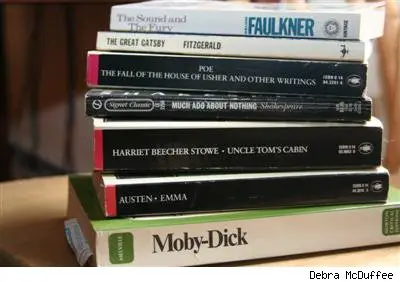by Jas Faulkner
 Jeremy is finishing a story while Kaia and I look at the clock. We’re waiting with a dozen other classmates for the big hand to click over to the twelve and the little hand to scoot to the six. At that point, at least for us, class is in session.
Jeremy is finishing a story while Kaia and I look at the clock. We’re waiting with a dozen other classmates for the big hand to click over to the twelve and the little hand to scoot to the six. At that point, at least for us, class is in session.
Not that anyone would notice if we were late.
After all, Jeremy is somewhere near Jackson Hole , I am in Nashville, Kaia is in Victoria, BC, and the rest of our study group is scattered all over the globe. Our classroom is a digital pocket of space and time, an online intellectual stasis chamber situated somewhere in 2009 at Yale. Open Yale Courses is home to English 300 Introduction to the Theory of Literature, a class that the fifteen of us watch as a group and then discuss in a private email list for the rest of the week. It is one of the forty-five online courses Yale offers free of charge to anyone with a desire to know more.
While many take in Yale’s offerings on their own, our group came together as a result of hashtag searches on Twitter and friends of friends who connected over the love of books and authors and music and hockey. One evening the discussion turned to those books that many of us skimmed or faked our way through. At book stores we would pass tables full of those titles set aside for students as part of their summer reading.
Did we really miss much by passing up Melville for Harlan Ellison or Ray Bradbury?
The prospect of filling those holes in our knowledge can seem daunting and in the past, even a learning annex or continuing ed class might require an investment of t ime and money that is too steep for many. Reading groups devoted to recouping those missing chapters in our cultural literacy have begun to appear at libraries, book stores, churches, and community centers. Membership configurations run the gamut from girls’ nights out to parent-child sharing of the same title.
For others, the reading groups don’t quite fill the bill. There is the need for learned authority and frankly, we miss the structure and feel of actually being part of a class. In addition to the results-oriented nature of class work, there is the serendipity of who you get as a classmate. Obviously this is more controlled with the self-paced classes at Yale.
Over at Coursera, classes are more structured. The sessions have set dates if you want to get a certificate of completion. There are quizzes available and online discussion groups for those who were inclined to dive into the intellectual mosh pit of online studies. The drawback is a dearth of basics when it came to anyone trying to get a lit fix or fix their lit knowledge base. Many of the classes are intriguing amalgams of right brained tech with unfettered left brained creativity. New media and gaming are popular subjects among the Coursera crowd.
Our motley crew of online Yalies is a mixed bag. The majority of us are in our late forties, but there are a couple of students in their seventies, one octogenarian, a precocious middle schooler who has gotten comfortable enough to correct our Latin and French, and a smattering of twenty- and thirty-somethings. Most of us are here to do it again and do it right instead of doing it just for the grade and credit hours. Others are here to shore up shaky or forgotten knowledge bases in preparation for a return to a classroom sometime, somewhere in the future. There are also those who never had the chance the first time around. Family difficulties and financial limitations made classwork something that might happen someday.
Their someday is now.
There are times when I am tempted to not take this so seriously. Then I remember that at one point I was an overly earnest undergraduate who was passionate about various subjects. I can remember being absolutely giddy, sitting at an intellectual precipice and looking out over what seemed like a huge vista of information to be explored. And I remember that not every adult got to feel that way as a young person. The old married love I have for academia is a counterpoint to the flush of new possibilities for some of my classmates. Those classes are like the books yet to be opened. I remind myself that it was the love of books, the commonality of our love of words, these are the things that brought all of us together in the first place and this is what makes moving forward together so wonderful.
